On September 30th, 2019, led by Professor WANG Kun of Tsinghua SEM, over 30 MBA students of Class 2017 & 2018 and alumni started the learning journey of Tsinghua MBA 2019 Innovative Leadership: Washington Module at University of Washington in Seattle of the United States.
Seattle in October is full of charm, not only because of the beautiful lakes and mountains, but also of the well-know companies like Microsoft, Boeing, Starbucks, and Costco that were bred here. The beautiful University of Washington, like a pearl adorned in Seattle, is where generations of students graduated and contributed to the new blood of innovation and entrepreneurship of the city, the US and even the world. That’s also why we had Tsinghua SEM MBA Innovative Leadership courses at University of Washington in Seattle, where favorable timing, location and support of people were combined together. During the 5-day program, we had an opportunity to closely feel the charm of Seattle in innovation and leadership.

Tsinghua MBA teachers and students at University of Washington
In the module, four well-known teachers of University of Washington were invited to give lectures for students. The teachers have all made achievements in their own fields, and they brought to students classes of rich content and interactive experience.
On the morning of September 30th, Mr. Jean Choy of University of Washington gave us an excellent lecture on communication. With diverse teaching methods, Mr. Choy explained the profound in simple terms and highly summarized the five tendencies in interpersonal communication, and thus we had a clearer distinction and identification basis in knowing ourselves and others. Making a high summarization of traits exhibited by various people is beneficial for us to identify people around us and communicate with them more efficiently. Identification is only the first step, on the basis of which we should promote strengths and avoid weaknesses, and treat people with different personalities in corresponding ways. By mobilizing all aspects of our own character, we could make highly efficient communication in order to make others feel comfortable and to express ourselves fast and clearly. To achieve an even better effect in communication, we should also use appropriate facial expression, pronunciation, speech rate and body language.
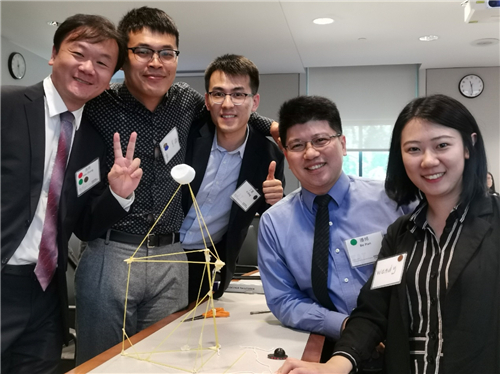
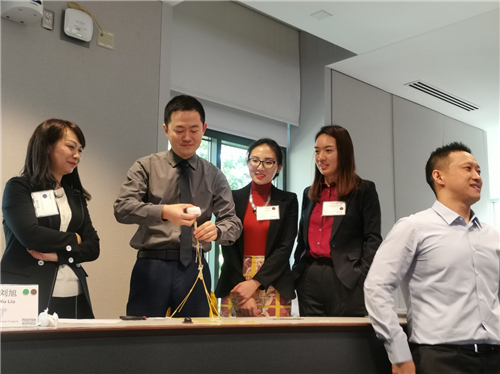
Students actively participated in interactive session of Mr. Jean Choy's class
After the course was finished, we visited the beautiful campus of University of Washington, feeling the sound academic atmosphere and open and inclusive environment at the university. On the 70th anniversary of our motherland, although the teachers and students of the module were far away in Seattle, our hearts were with our homeland. Led by the teacher, we sang the song Me and My Motherland together, holding national flag in hands and taking pride in being Chinese wherever we were.


Visiting the beautiful University of Washington during the National Day holiday
On October 1st, Professor Leta Beard with senior experience in Marketing and Business Case Competition explained in details to students about the experience for them to use in various case competitions in future, which proved to be very helpful for each student on the spot. These highly summarized experience, such as logically clear expression, concise ideas, and quick cut-in techniques, can be applied in university case competition as well as in day-to-day work presentation.
During the class, Professor Beard guided us in an in-depth discussion of the trend of globalization: is globalization or anti-globalization the mainstream of the modern era? The question made us fall into deep thinking. We’ve seen many successful cases of globalization like Starbucks, and also the failed case of Gerber. Each student participated in the discussion about such issues, for example, how to enter the EU market, how to enter the Indian market, how the law and regulation restricted the process of globalization, how to adapt to the unique local market and achieve localization.
During the class, Professor Beard also guided students to do a very interesting experiment of blind testing Pepsi and Coca-Cola, which allowed students to discover many interesting cultural differences between China and the United States. For example, as for counting ballots, the Chinese students in the class did not hesitate to choose writing character Zheng (with five strokes) to count so that they completely neglected they were counting in the American system. A further analysis was made to distinguish each country’s cultural distinction, such as the Japanese way of implicitness, and the Swiss and German way of very direct expression. Only by fully understanding the cultural differences between countries can we become highly efficient managers with global perspectives.
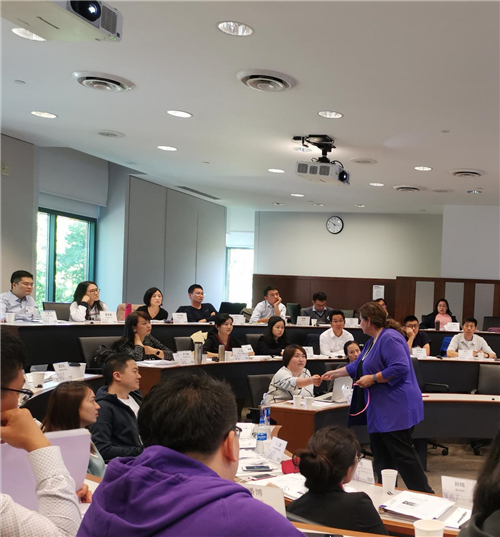
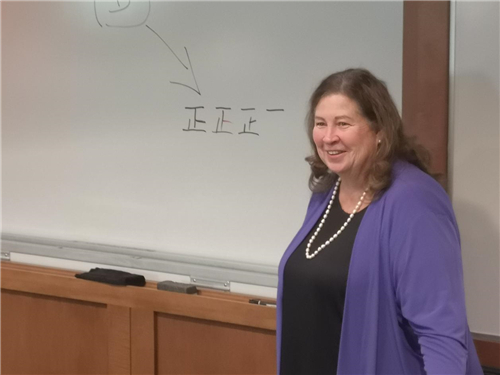
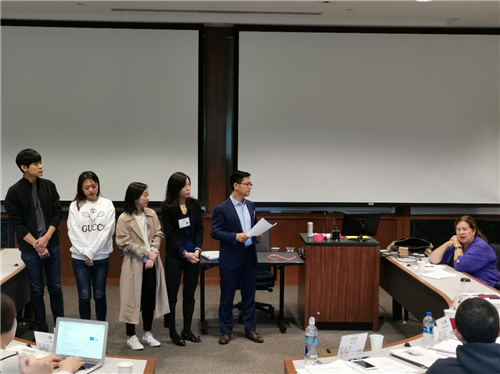
At the lecture by Professor Leta Beard
After the morning class finished, we went to the headquarters of Costco in Seattle, and were received by Mr. James Murphy, the COO in charge of Costco’s international business. In the planned one-hour company introduction, as everyone had strong interest and kept raising questions, the meeting was extended by nearly double the time. Considering the flourishing new stores that opened business in Shanghai recently, and relevant news that took wide media coverage, students raised lots of questions correspondingly. Why did the stores enter China so late? When would they continue to open stores? How to determine the type of goods, etc. Mr. Murphy gave us detailed and thoughtful answers, of which the most impressive one was that corporate culture and the prudence about doing business, as the most important factor for the company, had enabled Costco to maintain efficient and stable development since 1983.
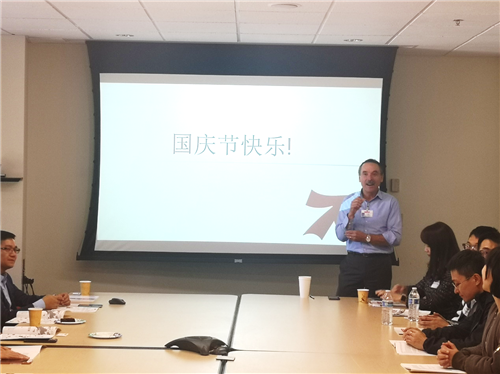
Mr. James Murphy was sharing his ideas
Then the most exciting part of this visit came when students walked into the physical store of Costco. No matter how detailed and lengthy the previous introduction had been, it was better for students to experience it themselves. In the store, students started crazy shopping. The dazzling goods, cheap price, meticulous and thoughtful service, and highly efficient operation hidden behind, were all displayed vividly in this shopping experience.
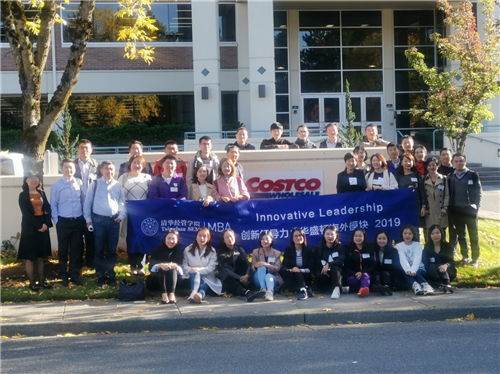
At the headquarters of Costco
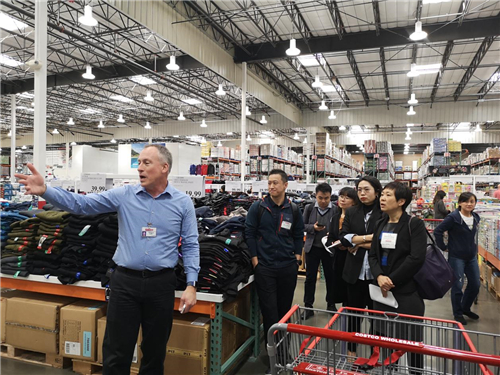
Staff at Costco introduced to students the store display strategy and skills
In the global leadership course by Professor CHEN Xiaoping on the morning of October 2, we learned that as for the development of leadership, 30% came from innate gene, and 70% came from acquired cultivation. Through theoretical, empirical, and case-based lectures, the course led us to cultivate innovative leadership and thus influence people of different cultural backgrounds to achieve the common goal of the organization. First, it’s necessary to fully understand differences between cultures, such as gestures, movements, time concepts, high and low contexts, and etc. Second, the encoding process made by information transmitter and the decoding process made by information receiver could not be exactly the same, and therefore, feedback should be emphasized in communication to improve communication efficiency.
Professor CHEN’s analysis of independent self and interdependent self has inspired us much. By analyzing the personality types of ourselves and others, we could get a clearer understanding of behavioral motivations of different people, which is very important to improve teamwork efficiency and reduce communication cost in future work. Professor CHEN’s brilliant smile in the classroom has infected every one of us. It is inseparable from her study and thinking about self and human nature in spare time. In a time of fast-paced life, perhaps we should also take the time to have some in-depth conversations with ourselves, to collect ourselves and to reflect on ourselves.

With Professor CHEN Xiaoping
In the afternoon visit to Microsoft, we felt Microsoft’s rigorous and pragmatic corporate atmosphere and innovative spirit. Mr. GUO Yuting of Microsoft’s Cloud+AI team shared with us his career development. From his sharing, we realized that we should plan our career based on what we valued most: core positions/number of people managed/salary/contribution to company and society. As “we can’t have the cake and eat it too”, only by focusing on the core point can we be clearer about our direction. In addition, we should be more far-sighted. Job-hopping is like playing chess. As we consider job-hopping, we should not only consider the next job, but also the one after the next and even how to set up the chessboard in future.
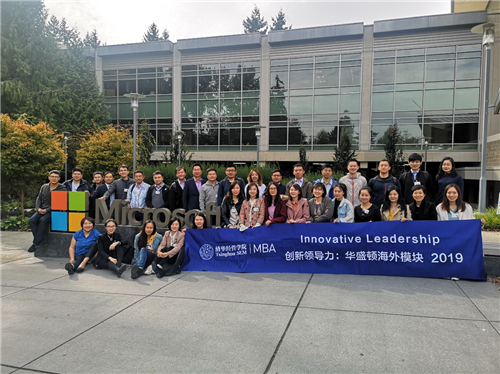

At the headquarters of Microsoft
On October 3, through Professor Suresh Kotha’s on-the-spot teaching drill analysis on Harley motorcycle’s globalization case, we fully understood that the globalization of economy and enterprises was the key to sustainable development of enterprises. In particular, the professor had a comprehensive analysis of the entire case by using practical analysis tools such as Dash Board, Strategy Analysis, and SWOT analysis methods. Especially in the SWOT analysis, the analysis of advantages, disadvantages, opportunities and threats has provided direction of effective thinking and analysis logic for our subsequent practical work, so that we could identify the problem, analyze the problem, propose solution, and review and evaluate the solution in a truly systemic way.
The globalization of international enterprises will promote the sustainable development of enterprises and achieve the win-win and symbiosis of the community with shared future for mankind. Based on the specific course, Professor Kotha guided students to think about the internationalization of China’s enterprises, and students realized that it was necessary to fully analyze the differences between cultures, to analyze the influence of the international politics factor, to consider the general supply chain, and the development and strength of competitors. In order to make effective investment decision and judgment, it’s necessary to fully analyze one’s own advantages and disadvantages combined with the growth prediction of market on the whole and based on the strategy focusing on competitors and competition environment.

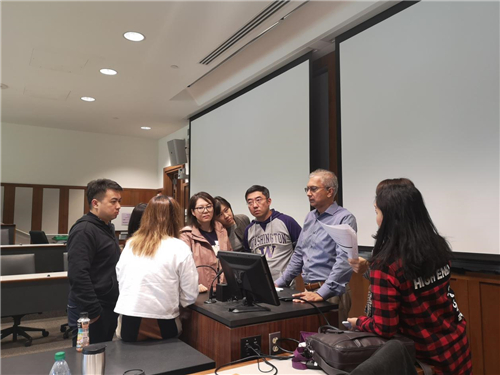
Students discussed about international strategic issues with Professor Kotha
The final presentation and case competition are very important closed-loops in a complete learning program, as they allow the short-term learning content to be quickly and deeply solidified, and also offer a good opportunity to improve teamwork, leadership and highly efficient implementation capacity. On October 4th, students had been fully prepared, and some teams had even worked till late at night, in order to display the competence of Tsinghua students in the competition next day. Some team appeared calm and unruffled, with comprehensive and professional analysis, which was very impressive. Some team used various models for analysis, including CAGE theory and 4P model, displaying their learning achievement in Tsinghua MBA courses. Some team presented a wealth of data, including macro-policy, national and demographic data, and business management data. Some team had made wonderful video all night, presented the case background with more enriched methods, and finally won the competition.

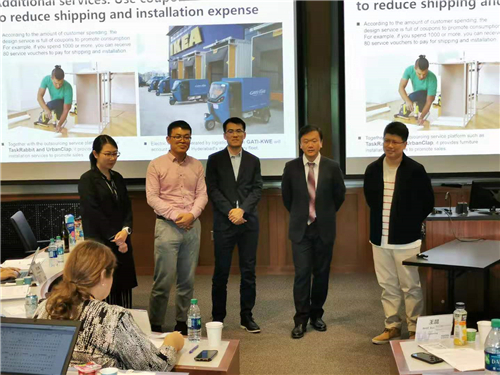
On the scene of Case Competition

The winning team
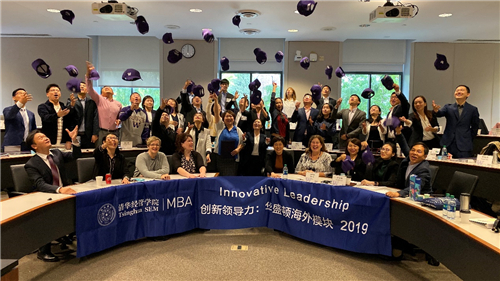
A perfect completion of the course
Looking back on the course and visit arrangements of the entire Seattle module, each part is of high quality and efficiency. We appreciate much the MBA Programs’ carefully organized and hard work.
The mission of Tsinghua SEM is to create knowledge, to cultivate leaders, to contribute to China, and to influence the world. This mission and vision are reflected in the spiritual outlook of every SEM student. We were born in a great era and would strive to put what we have learned into the practice of work and life in future. We would continue to maintain good communication with our teachers and other students to achieve a better self and a better future.

The Washington module this year also open to MBA alumni
Contributed by: HE Wenjun of 2017 MBA
Edited: ZHU Yidan, GAO Zhili